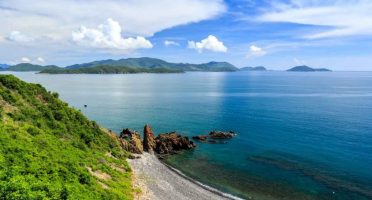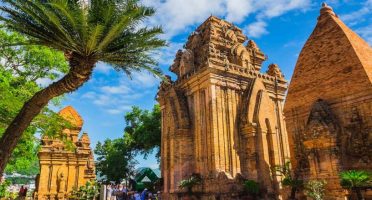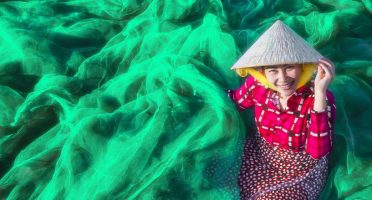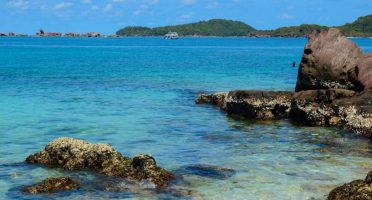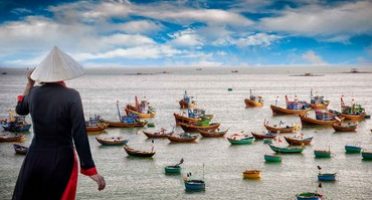Together with stunning natural beaches, Nha Trang also impresses tourists with the unique architecture of the Champa empire. And it would be such a big pity for missing Thap Ba (Tower of Lady).
I. Basic information of Thap Ba (Tower of the lady)
Thap Ba (Tower of the lady) is also known as Yang Po Inu Nagar or Yang Po Ana Gar (Inu, Ana in Cham, Ede, Jarai means female). The full name is Po Inu Nagar, also known as Po Nagar.
1. Where Is Thap Ba?
It is a Cham Pa temple located on the top of a small hill about 10-12 meters above the sea level, at the mouth of Cai river (Nha Trang river) in Nha Trang, Khanh Hoa province. About 2 km to the North of the city center, Thap Ba belongs to Vinh Phuoc ward.
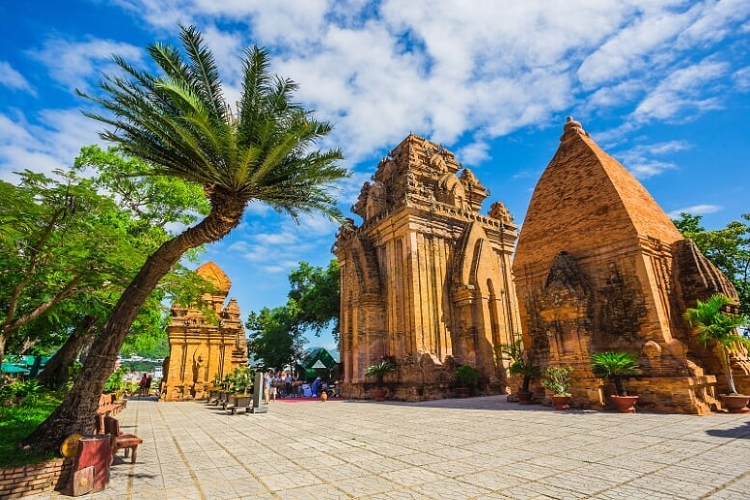
Source: Luxurytravelvietnam
2. Origin Of The Name “Thap Ba” & “Po Nagar Tower”
The name “Po Nagar Tower” is used to refer to the whole structure, but actually it is the name of the largest tower about 23 meters high. This temple was built during the Hindu (Hindu) flourishing period when Champa was in a period called the Hoan Kingdom. So the goddess image depicted Uma, the Shiva’s wife.
Queen Po Ina Nagar (also known as Yang Po Nagara, Po Nagar, Black Lady or Thien Y Thanh Mau Ana according to Vietnamese is a goddess created by the cloud and sponge, as well as the creator of the Earth making precious wood, trees, and rice.
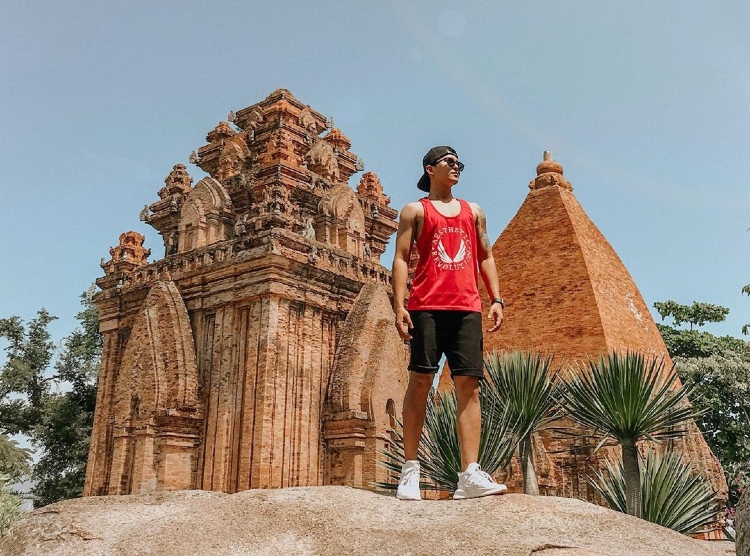
Source: Instagram @Liam.Truong
She has 97 husbands, of which only Po Yan Amo is the most influential and respected person. She has 38 daughters, all of whom became goddesses, including three chosen by the Chams to protect the land and be worshiped today.
- Ticket price: 25,000 VND / pax
- Opening hours: 8:00 – 18:00
To visit Thap Ba or request more information, please contact us here
II. What is the best time to visit Thap Ba?
The best time to visit Thap Ba should be the dry season from January to September (the rainy season is very dirty). In addition, it is recommended to visit around lunar March (March, April of the solar calendar) to see the Ponagar Festival in Nha Trang.
III. The unique architecture of Thap Ba
Thap Ba includes three main areas.
1. Mandapa (The Vestibular Area)
It is the place you look from the main gate straight up and can easily see from 2/4 street. The overall architecture dating back to the 11th century was made of baked bricks including 4 large columns. Of which: there are 12 small columns outside the octagon and 10 large columns inside. According to research, the scientists said this could be the place to prepare the gifts before offering them to the ceremony. They found that at the top of each column there were holes. This is a high probability that the architecture is open and covered. Because of the time, there are no more roofs anymore. However, this is also a very unique highlight of Thap Ba.
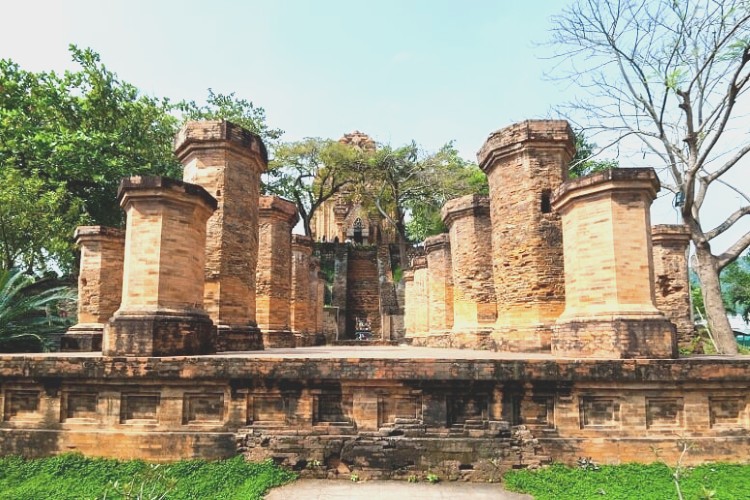
Source: Luxurytravelvietnam
To offer your incense for the queen, you have to go through steep steps. Sometimes, your right hand should stick to the stones above, but don’t fall back. The ancients believed that to meet the goddess, you must overcome challenges to be able to meet her. It is reverence for the god of the sky. Now people have opened stone steps along the hillsides, so the move will not be as difficult as before.
According to the old traces left, the east of Mandapa has 2 small columns and lower than the background on both sides of the stairs, up and down along with the main gate. In the renovating process, they accidentally discover the road and three steps in the east leading to the nave of the pillar building including 4 steps of 1.4m wide, 1.2m high and 2.6m wide, 7.4m long. Therefore, it has been proved that ancient Champa architecture has created a straight axis towards the main tower to worship Thien Y Ana from the gate – Mandapa – the steps leading to the temple – Main Tower.
2. The Temples
Based on the remains, the temple complex has a total of 6 Kalan. Kalan in Cham Pa is a temple/ tower. There exist 4 towers, 2 towers behind have been destroyed and only foundations left. The towers were all built in the same way in a square plan, only different in size and width. All the temples are straight from the foundation to the top, and the top is constructed in a conical shape.
Each tower has 4 doors facing East, West, South and North. But only the East door is open for pilgrims and extends to the foyer. The remaining 3 doors are shaped like fake doors. There is Thap Ba hot mineral spring behind, providing hot baths and high mud baths in Nha Trang.
a. The Northeast Tower
It is the main tower and also the highest tower of the complex at about 23m high. It was built in 813 – 817 and renovated in the 11th century. There are 5 rows of wall pillars along the tower body with 4 small towers in four corners of which 3 floors of the roof gradually shrink upwards. The roof of the Tower is compared to Meru mountain, the highest peak – where there are 5 mountains of the gods in Cambodia. It was decorated with mascots: Elephants, Geese, Goats … reflecting a deep spiritual religion.
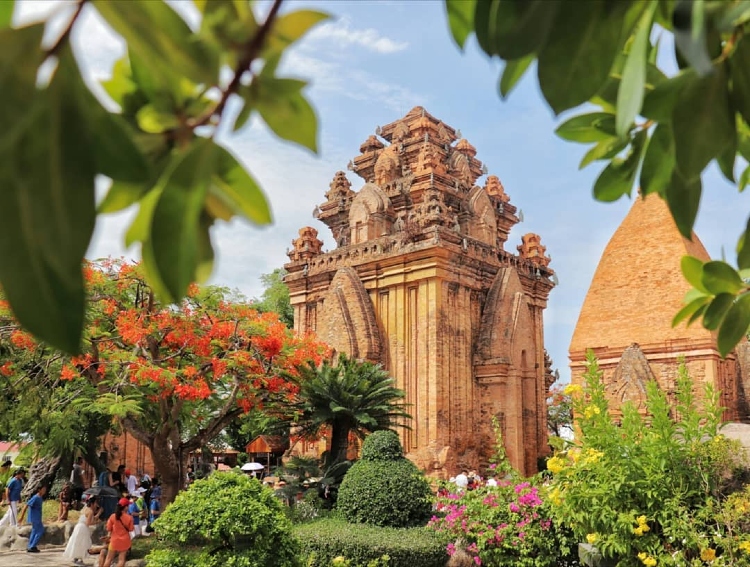
Source: Instagram @Katya_meder
Looking at the door arch, you will easily see the stone leaf-shaped bas-relief like the embodiment of 4 dancing arms of Shiva. Shiva’s right leg is on Nandin and there are flute musicians on both sides. The characters that appear in the bas-reliefs are shown to be very flexible, smooth with vibrancy. Moreover, the relief plate dating from the 11th century is also one of the most beautiful bas-reliefs of Champa culture in Vietnam. You notice on the stone pillars at the door with the inscriptions inscribed with Sancrit and Champa ancient letters.
At the base of the tower, there is a square shrine with a statue of the Ponagar. This is also the soul of Po Nagar tower in Nha Trang. This is also the statue of Uma – the negative symbol of the Shiva. And according to Vietnamese beliefs, therefore, the statue is draped in Siam, the two sides worship Co and Cau. In the past, the Cham Pa people lit incense and offered water. Later, according to the tradition of incense, it has been changed.
b. The South Tower
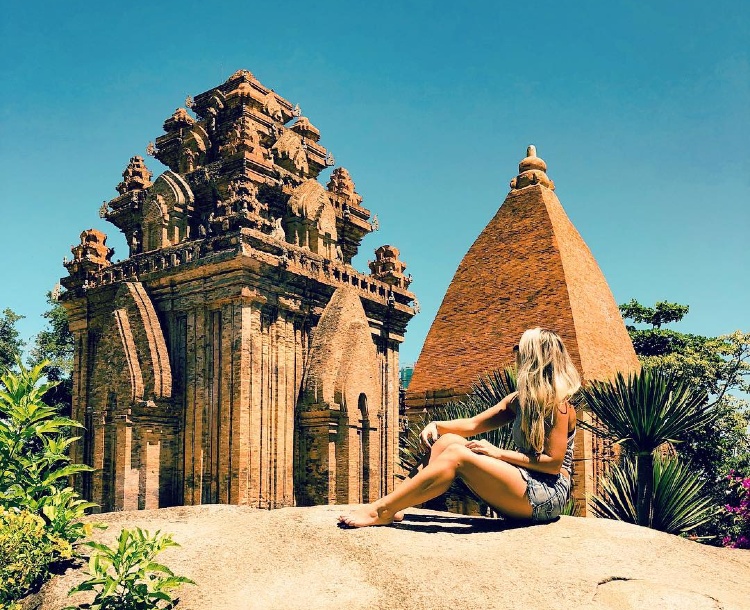
Source: Instagram @baileyk716
This is the second-largest tower with a height of 18m. You still realize the same motif, but only the roof is different. They are narrowed down into a pyramid, which is pulled upwards. There is a linga pillar on the top, which is said to be the place of worshipping Shiva – the goddess’s husband, also known as Ong tower since in the 13th century.
c. The Northwest Tower
This is the third tallest in the complex at about 9m, dating back to 817. It was renovated in the 13th century. The tower also preserves its decoration and architecture intact. Each fake doorway presents an exquisitely depicted mascot on baked bricks. The south fake doorway is the image of Garuda bird, the North is the Kala time god, the West is the elephant-riding statue of the goddess.
The tower has only 1 floor with a boat-shaped roof. Its architecture is soft, curved, bending inside, and showing two foreheads with carved gods sitting under the canopy of Nagar snakeheads. It is said that this is the worship tower of Co – Cau, the children of Goddess. The main mascots in the tower are Linga and Yoni. The Northwest Tower worships Ganesha – the symbol of luck, wisdom and happiness, thus people go there to pray for all things to bloom, and a life full of happiness, reunion.
d. The Southeast Tower
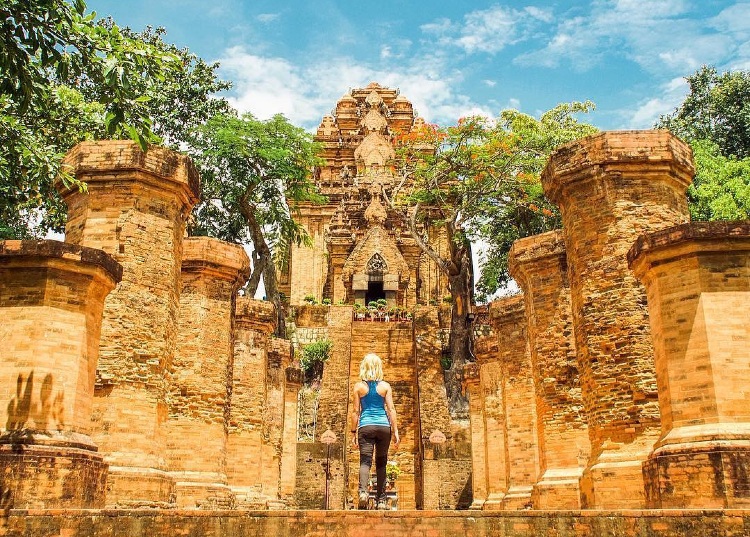
Source: Instagram @jonny.melon
Only 7.1m high, it is the smallest tower in the complex since the 11th and 12th centuries. The tower is also quite simple with a saddle or boat-shaped roof. You can observe familiar images of fishermen in Southeast Asia. The tower is dedicated to the Skandha power and war. This is also the tower to worship Mr. and Mrs. Tieu who conceived and nourished the Goddess Thien Y Ana.
3. The Stele
Currently, according to documents known in Ponagar, there are 28 civilized units; some of them have not translated. Behind the main tower is a stele written by Phan Thanh Gian and engraved in 1856 (Emperor Tu Duc) – a prestigious official of the Ceremony under the Nguyen Dynasty. In Han-Nom script talking about Vietnamese legend of Thien Y A Na Thanh Mau, the second stele was made by eight officials of Khanh Hoa and Binh Thuan provinces in 1871. The next stele was erected in 1972, the content translated into the national language of the legend of Thien Y A Na. The fourth stone tablet introducing the Ponagar Tower Tower was built in 2010. The ancient Champa inscriptions at Po Nagar Tower are of great value to researchers for the culture, religion and history of the Champa kingdom.
IV. Po Nagar’s cultural highlight of festivals
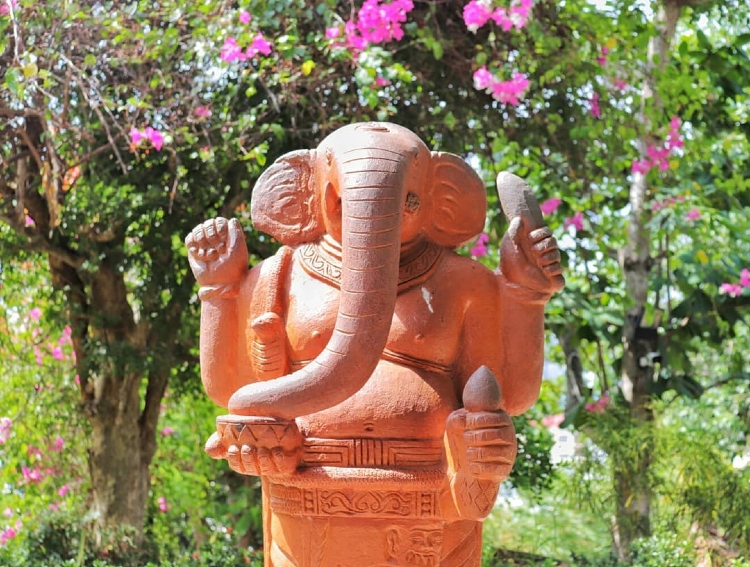
Source: Instagram @Katya_meder
Not only embracing spiritual significance to the Cham Pa people, but the Po Nagar tower festival is also a big holiday for Khanh Hoa people. Every year on March 20 to 23 of the lunar calendar, the locals offered flowers and offerings to the goddess to be full of happiness and pray for good rain and wind. Especially you can admire the virtuosity shadow dance of young girls, the head of the wrestling team, the fresh flowers, and the five-colored lanterns. The girls wore bright, latest Siamese robes, Siamese robes, and tipped, curled up to the music. Ball dance is characteristic of Cham people and only performed to the holly mother (Mrs. Thien Y).
In addition to ball dancing, the festival also takes place with a lot of rituals:
- Changing ceremony: at 12pm on 20/3.
- Flowering ceremony: at 7pm – 9pm on 20/3.
- Pray for peace ceremony: at 6am – 8am on 21/3
- Mid-year ceremony: at 12pm – 12h30pm on 21/3
- Traditional ceremony: at 6am – 8am on 23/3
- The ceremony of Sun King, Opening Ceremony: at 6am – 9pm on 23/3
- Mother Offering Ceremony: at 11pm – 24pm on 23/3
- Shadow dancing and singing: in all festive days.
- Water procession and presentation of fruit tray to the goddess contests: at 10am – 3pm on 23/3.
V. Po Nagar Tower’s nearby attractions
1. National Oceanographic Museum Of Vietnam
The National Oceanographic Museum of Vietnam is a place to study the life of marine plants and animals in Nha Trang city, Khanh Hoa province.

Source: Nhatrangtoday
This tourist destination has more than 20,000 specimens of 4,000 types of marine creatures kept, which have been collected and nurtured for many years. In particular, this is also a place to display a huge whale skeleton with a length of nearly 26m long, 3m high with 48 vertebrae that have been fully restored. Tourists can also see strange creatures and learn more about the life of marine creatures.
2. Long Son Pagoda
Coming to Nha Trang, tourists cannot ignore the sacred place of Long Son Pagoda – Long Son Tu Temple, which is especially famous for Kim Than Buddha To as a beautiful symbol of the city.
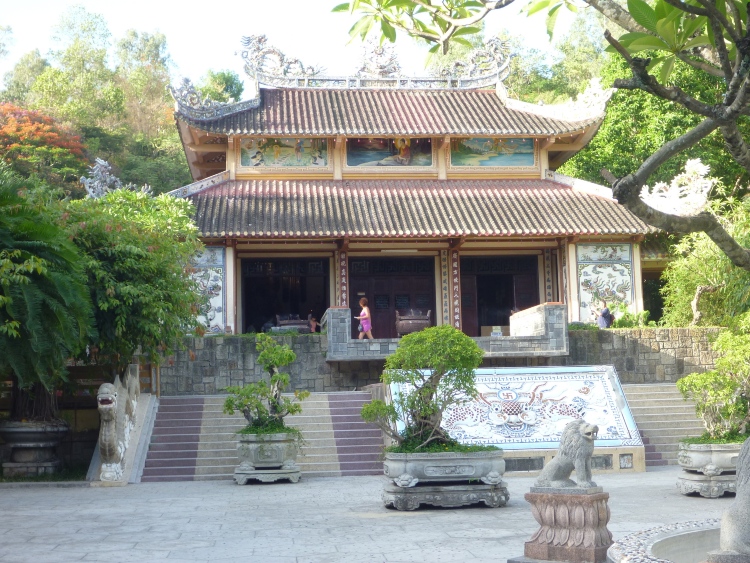
Source: Wikimedia – Nonvolatil
Located at the foot of Trai Thuy Mountain, Phuong Son Ward, Nha Trang City, Khanh Hoa Province, this is a majestic pagoda over 100 years and a place of pilgrimage for many Buddhists and a place to find peace in the soul of many people. Long Son Pagoda has undergone many renovations but still retains the ancient and solemn features inherent.
Looking down from the temple, you can admire the panoramic view of the beautiful city of Nha Trang.
3. Cau Da Villa
This is an extremely famous architectural complex and colorful history, attracting anyone whenever coming to Nha Trang. Located on Canh Long mountain adjacent to the sea, 5 villas with 5 different architectural colors are like 5 brightly blooming flowers in the middle of Nha Trang sky.
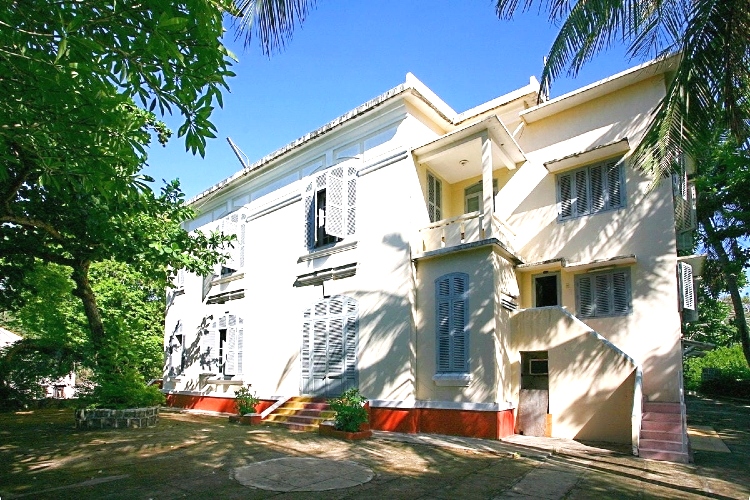
Source: qpdesign
Five villas were built to serve the research and work of Western oceanographers, but they have now become tourist attractions in Nha Trang. The beautiful villas are built on the three high peaks of Canh Long Mountain and the special feature that visitors cannot forget about this place is that people have named the flowers to name the mansion. These names have made a special feature, charm and a little mystery for the villas here.
Constructed with a relatively small scale, each apartment has only two floors but each brings in classic French architecture. The villas vary in detail but the overall is still surrounded by sophistication, elegance and luxury.
Inside the villas, you can see exhibits of furniture from the time of Bao Dai King from tables, chairs, the salon to phones or tableware. The sunny corridors facing the sea are also a beautiful highlight for the scenery here.
V. Explore Thap Ba (Tower of the Lady) with Lux Travel DMC
For more details and itinerary, please have a look at these trips. Or feel free to contact Lux Travel DMC. Let’s check.
Or for more Nha Trang beach relief choices:
Contact Us
- Address : No.456 Lac Long Quan Street, Tay Ho District, Hanoi, Vietnam
- Phone: (+84) 4 3927 4120
- Email: sales@luxtraveldmc.com
- Hotline: +84-336-276-996
- Website: https://luxtraveldmc.com
